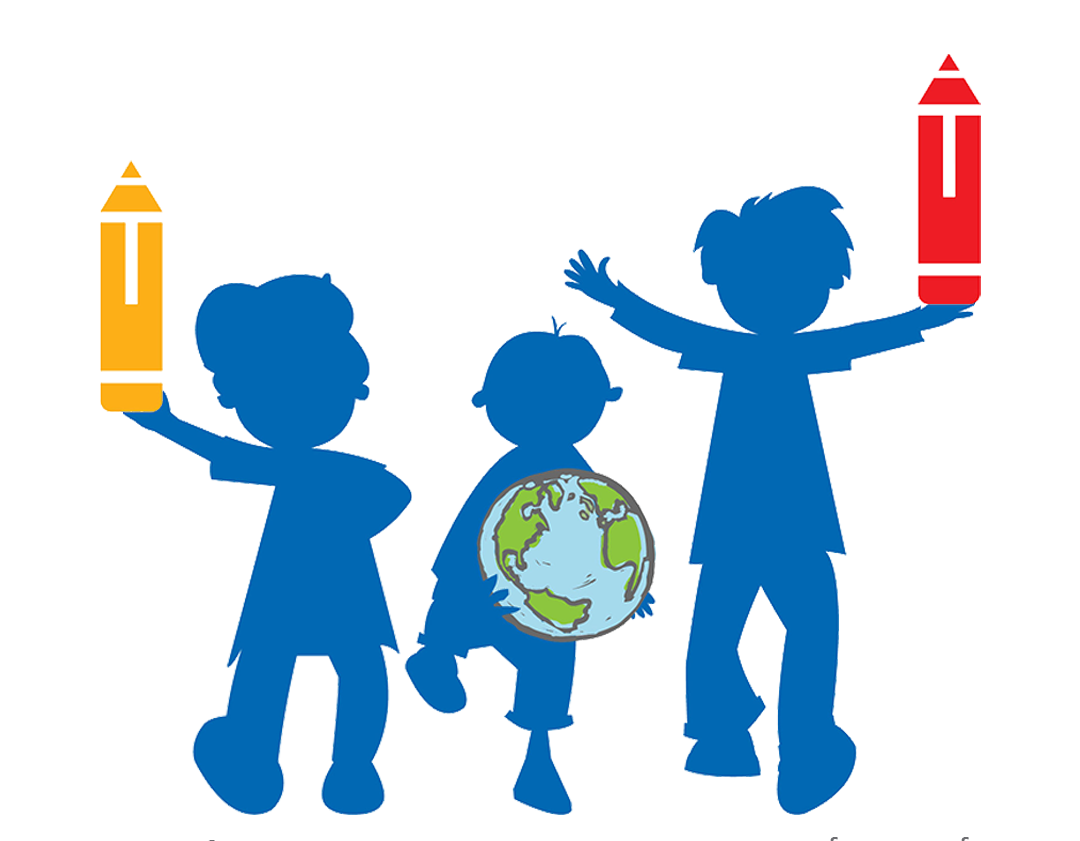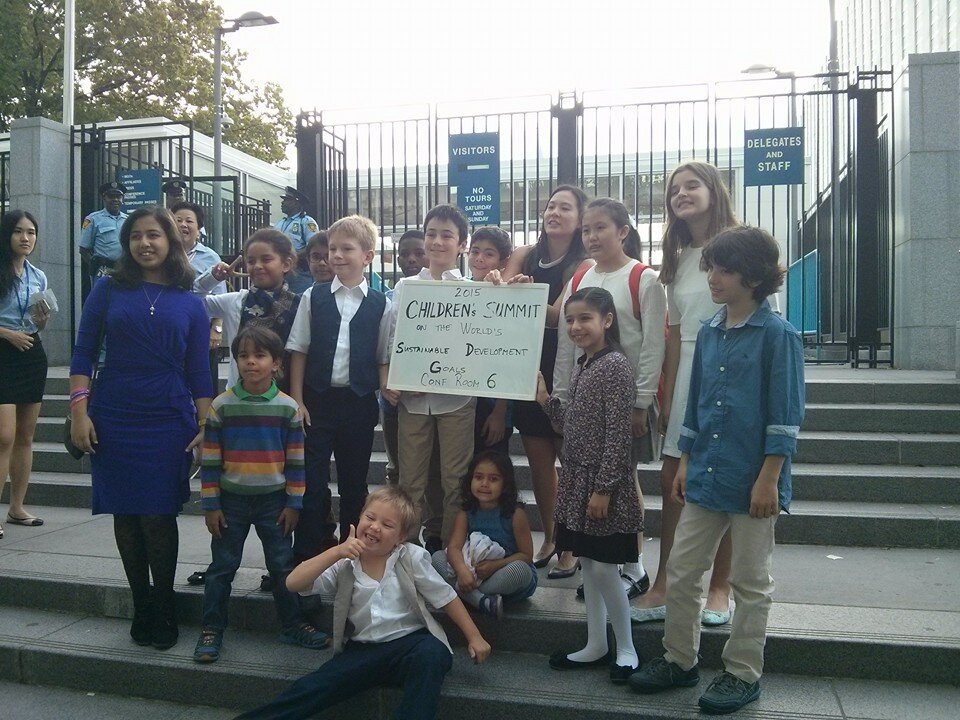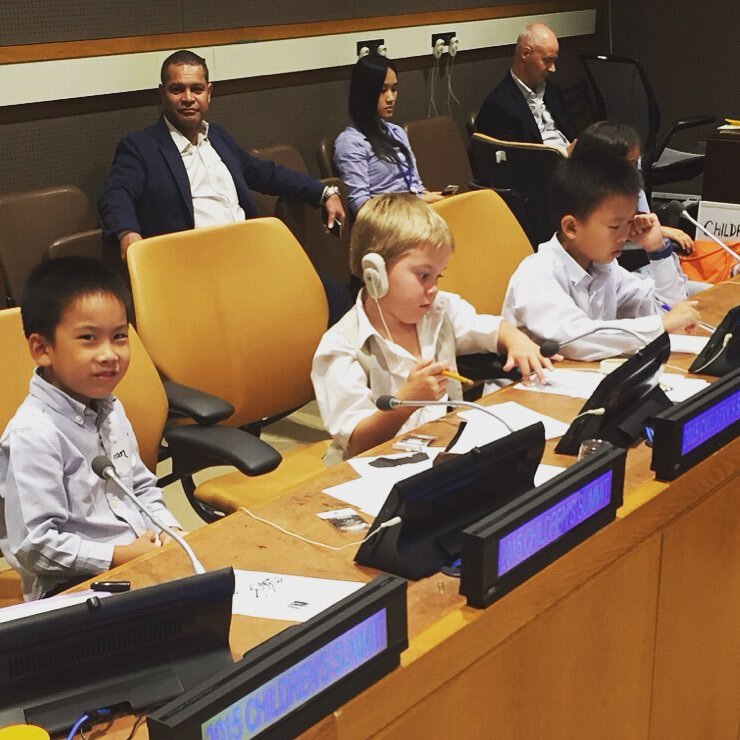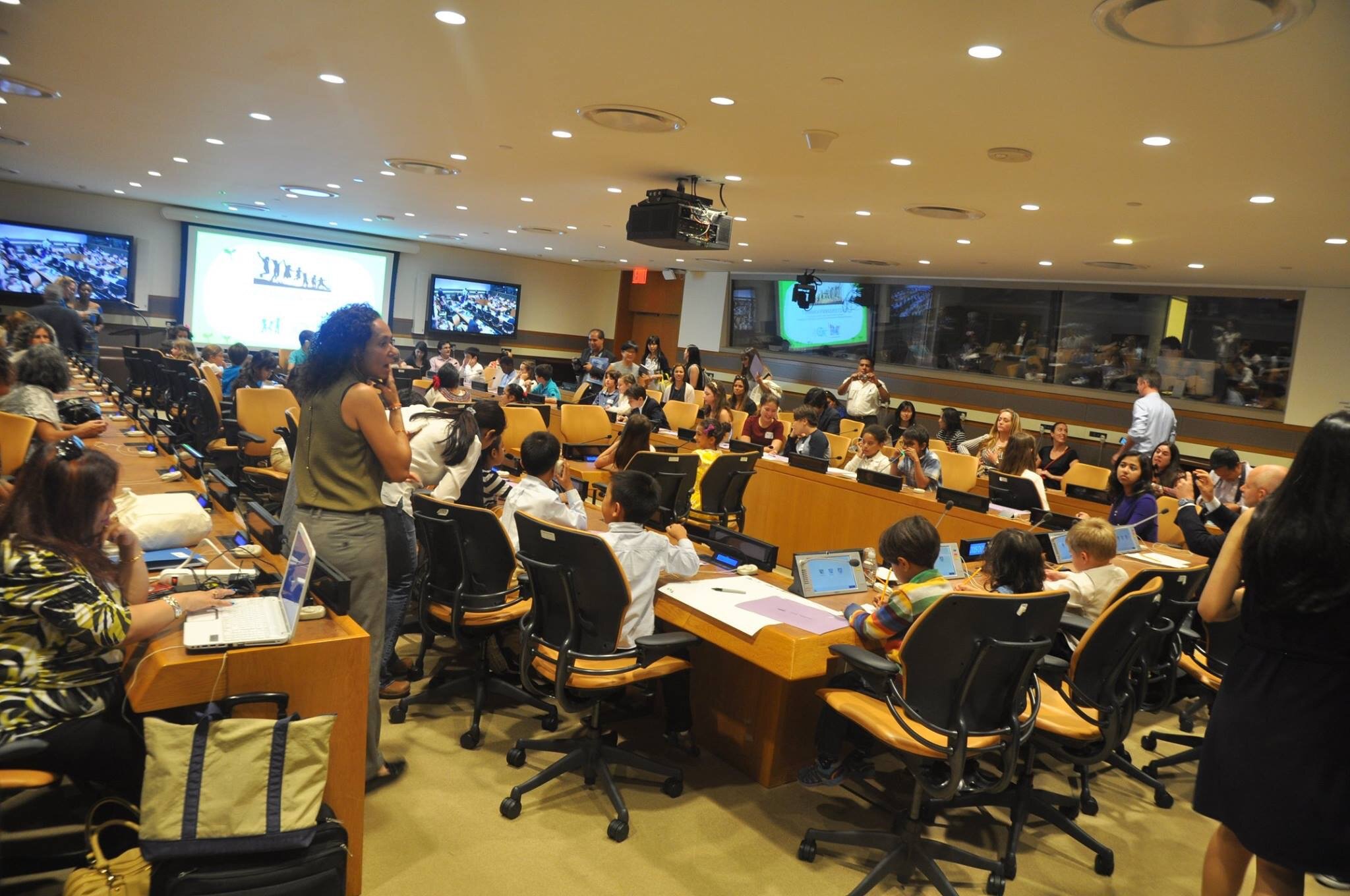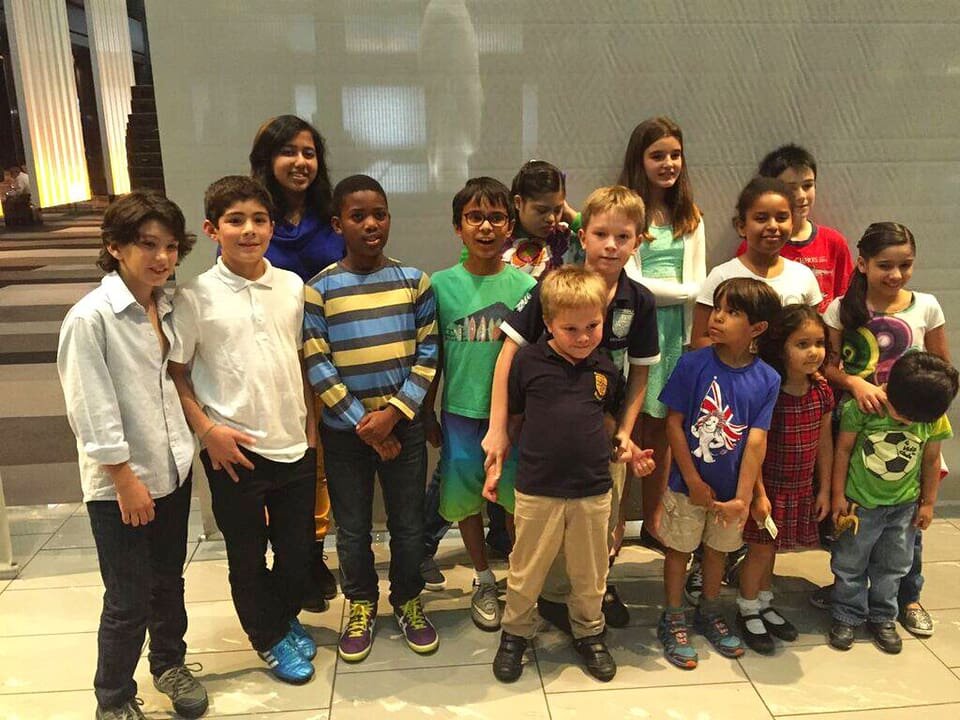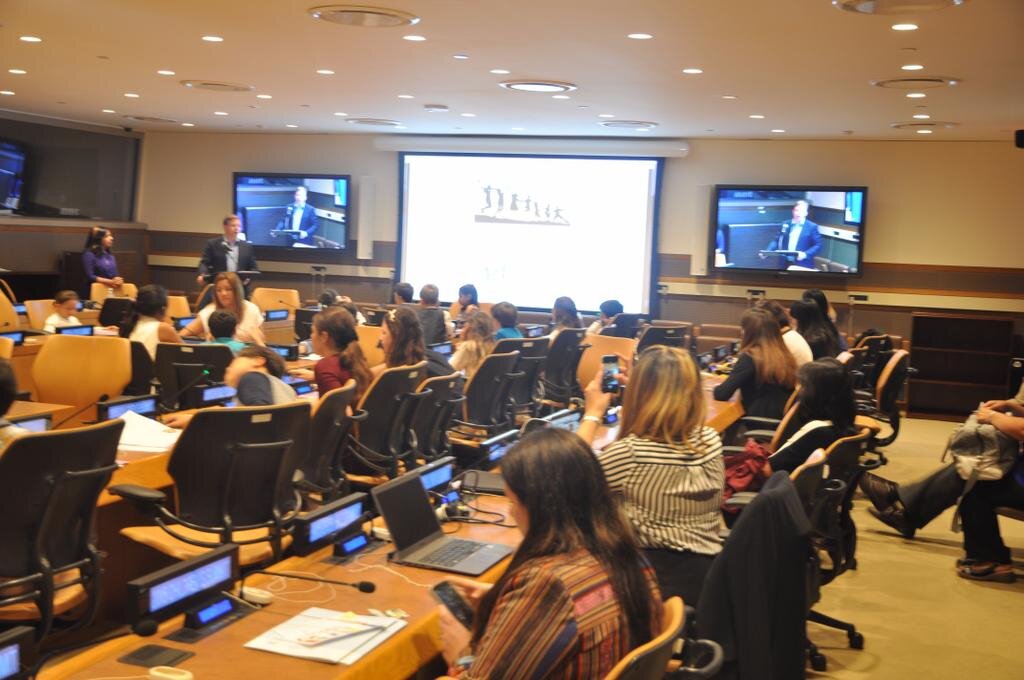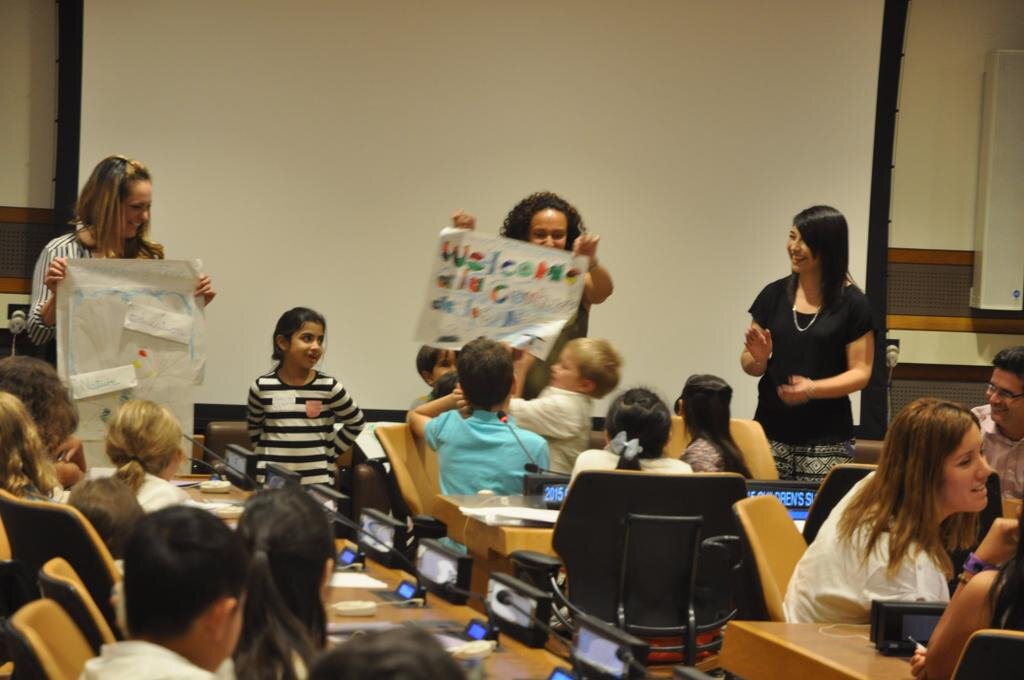2015 Children’s Declaration on the World’s Sustainable Development Goals
The Children assembled at the Children's Summit, 20 September 2015, New York, United States of America, with special thanks to the 2700 children from over 70 countries who contributed amazing ideas online,
Considering that children are the foundation of our future development,
Recalling that we are not only the voices of future generations but current global citizens who must play a part in decision-making,
Convinced that the decisions the world makes today will impact and define our future, and recognising that this makes us principal stakeholders,
Have agreed as follows:
Promoting the voices of children
1. Children must have our voices heard, on both national and international levels. Political leaders should listen to, and respect, what children have to say.
Equality
2. All people are born equal, and no one should be discriminated against.
3. We must make sure that children around the world grow up in a peaceful society, with equal opportunities for everyone.
4. No one should be discriminated against based on age. Children and adults should be seen as having equal worth.
5. We must speak for those without a voice, and ensure that the most vulnerable are protected.
6. Children have the right not to be bullied or mocked.
7. We must focus on children's abilities, not their disabilities. We must raise awareness about children with different abilities, and fight against prejudice and discrimination against them.
8. Everything in the world will become stronger when men and women, boys and girls work together. Without equality, no change will occur.
9. No one should be judged based on where we come from, what we wear or what we believe in. Cultural barriers should not hold us back.
10. Children have the right to play, imagine and dream whatever we want, without discrimination.
11. We have the right to be kids. No one can change who we are.
Poverty
12. We must find ways to spread global wealth so that everyone can have the basic necessities in life, including food, water and shelter. Many of us take things for granted, while others have nothing.
13. We must all share our resources so no-one is left behind. Our dream of "a life of dignity for all" can only be achieved once poverty is eradicated.
14. Poverty is not just an economic problem, but also a social one. Its eradication can be achieved only through a social change where every citizen takes it upon herself and himself to come to the aid of their fellow citizens.
15. Everyone should be encouraged to learn self-sustaining and income generating activities for economic development.
16. We must invest in basic, sustainable infrastructure to improve the standard of living for communities worldwide. This requires coordinated, long-term planning across geographic, political and cultural boundaries.
Family
17. Children have the right to a family to take care of us and help us grow so that we can make our dreams come true.
18. Children have the right to feel secure in our own homes.
Education
19. Education is our birthright and should be free for all children.
20. All children should have a real possibility to obtain an education. Education should be adapted to our abilities, and be adequate for our interests and goals.
21. Sustainable development must be included in our educational curriculum, to ensure that all children know about its importance, and ways to achieve it.
Security
22. We need secure environments to study, play and develop our talents without fear of kidnapping, terrorism, tribal clashes, religious wars, or other forms of violence and unrest affecting us.
23. Everyone should grow up in peace. We should form global partnerships to prevent wars.
24. Children should be protected in times of war. No child should be a soldier or participant in war.
25. Children should not be forced to flee our homes due to war. If we do have to leave, we should be welcomed and given special protection.
26. Violence against children, in all its forms, must be prevented. It stops children growing as individuals, and our society growing as a whole.
27. Legal frameworks and mechanisms must be provided in every country and internationally to enable children to defend our rights.
Health
28. All children should have access to safe and clean drinking water, sanitation and toilets. We must ensure that water supplies are not contaminated by chemicals and other hazards that might damage our health.
29. Children have the right to understand and be able to address our own, our families’, and our communities’ health. This should include physical, mental and environmental health.
30. Too many children are dying from preventable diseases, and from malnutrition. We must ensure that everyone has access to doctors, hospitals and comprehensive and lifelong health care, and access to basic medicines. Children should be given special protection against preventable diseases.
31. Sustainable food consumption, including local production and distribution infrastructures that will make nutritious food available, accessible and affordable to all in the future, must be encouraged, and children can help.
32. We need well-balanced and nutritious food for the development of our brains, to grow and be healthy. This will give us the energy to study and play and be able to develop all our talents.
Child labour, child marriage, and child trafficking
33. Every person has the right to decide who they love, and if they want to get married. There should be no child marriage.
34. Child labour must be stopped, once and for all. Children should be in school, not work.
35. We are not products, we are people. Children should not be sold or trafficked.
Protecting the environment
36. We must recognise the threat that climate change poses for our planet, and our future. 37. Everyone has the right to clean air and a clean environment, especially children.
37. We must all pay more attention to the world around us. Without healthy ecosystems, everyone will suffer. We should not destroy our ecology and all other species for temporary interests.
38. We must preserve the environment and natural resources, and protect plants and animals. They contribute so much to our lives, but are used and abused with little thought to the consequences.
39. We must be careful how we fish the seas, so that we can preserve marine life for future generations.
40. We must also protect our rivers and oceans, as many species are in danger from waste and rubbish in our waterways.
41. We must invest in reliable forms of energy, and move to clean and renewable energy, fully and irrevocably.
Awareness raising
42. We can work as children and lead in campaigns that shape developmental agendas because we are the future. Children all over the world should advise our parents, our teachers and all other adults to make the real steps for ensuring sustainable development.
43. All people must be made aware of the need for sustainable development, and children should lead the way in this. This can be done by starting new social movements, creating posters, blogs and radio shows, and even writing our own books.
44. We must all play our part in peer education to reduce negative actions in schools and in the community.
Working together
45. One person does not have all the ideas and all the answers. We must network with people of other cultures and races, and learn from others.
46. We must all act together to make a real difference. We can create a platform for global interaction to share information, and take action.
47. The Earth belongs to all of us. If only one child cares for it, nothing will change.
The Child Authors of the Voices of Future Generations Children’s Books Series, Child Ambassadors for the SDGs and all the Children of the 2015 Children’s Summit on the World’s Sustainable Development Goals would like to thank the UN Education Science and Cultural Organization the UNICEF and the International Union for the Conservation of Nature, among other international organizations, for all the amazing work they to do help children, education and sustainability, and especially the UN Department of Economic and Social Affairs Division on Sustainable Development who co-hosted the 2015 Children’s Summit. We would also like to thank all the epic educational charities, world-leading schools and others across civil society and the world who work tirelessly for future generations. We pledge to become Child Ambassadors for the UN Sustainable Development Goals (SDGs) in our schools, communities and countries, and internationally, today and towards 2030.
